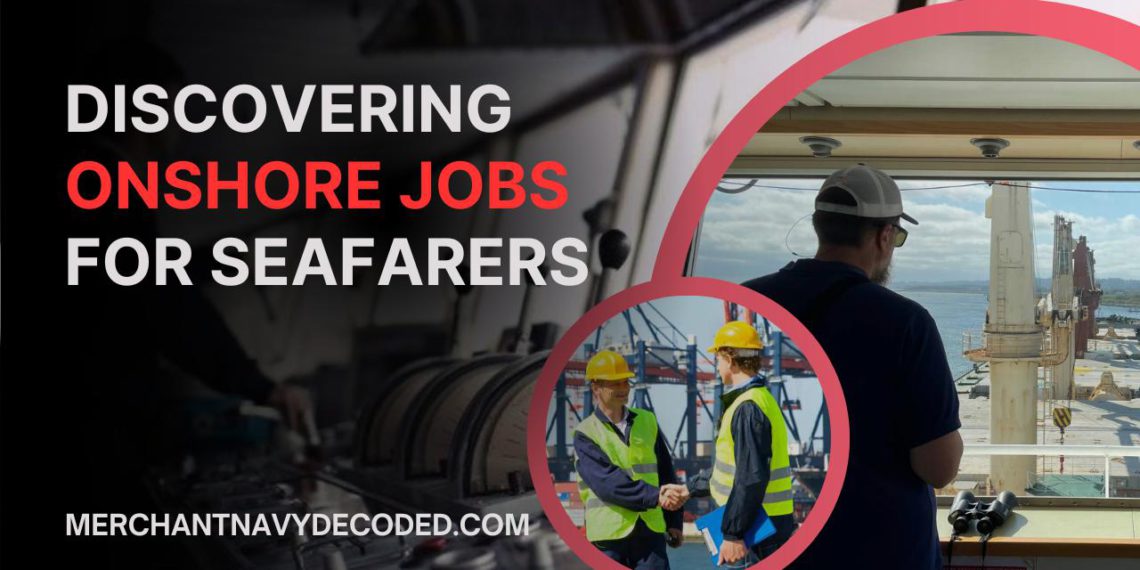Discovering Shore Jobs for Seafarers | 2023
Overview
In this blog, we will explore the exciting world of Shore Jobs for marine engineers, especially those related to the shipping industry. We’ll break it down into three main parts.
But before that, if you are in a dilemma of joining a shore job or not then our previous blog is for you. So find out if it is the right time to shift onshore or not.
- Core Shipping Jobs:
Learn about jobs that directly connect to ships and ports. These include managing ports, checking ships, and making ship deals.
- Broader Shipping Roles:
Discover jobs that are still connected to shipping but reach beyond. These roles involve handling cargo, making supply chains work smoothly, and making sure goods cross borders correctly.
- Jobs Unrelated to Shipping:
Find out about other jobs you can do after leaving the sea. This includes becoming a real estate agent, a business expert, or even starting your own company.
Whether you’re a sailor looking for new opportunities on land or just curious about onshore careers, this blog will help you navigate the possibilities in simple terms.
Exploring Core Shipping Jobs
What are core Shipping Jobs?
These are land-based roles closely tied to the heart of maritime operations, involving tasks such as managing ports, inspecting ships, and handling ship transactions.
Advantages:
- Specialised Knowledge:
These roles often require specialized knowledge of shipping operations, making you an expert in your field.
- Global Opportunities:
You may have the chance to work in various international locations, gaining exposure to different cultures.
- Stability:
Shipping is a fundamental industry, providing a certain level of job security.
- Variety of Roles:
There’s a wide range of roles within core shipping, allowing you to find one that aligns with your interests and skills.
- Competitive Compensation:
Many core shipping jobs offer competitive salaries and benefits.
Disadvantages:
- High Pressure:
The shipping industry can be high-pressure, with tight schedules and the potential for unexpected challenges.
- Long Hours:
Some roles may require long and irregular working hours, particularly in port operations or during emergencies.
- Risk and Safety Concerns:
Working in core shipping roles can involve inherent risks, such as accidents or environmental incidents.
- Physical Demands:
Certain positions may require physical labor and exposure to harsh maritime conditions.
- Continuous Learning:
Staying updated on evolving regulations and technologies is crucial, requiring ongoing education and training.
Here are some descriptions of Major core shipping-related jobs:
Port Operations Manager:
- Oversees the daily activities at a port, including ship arrivals and departures, cargo loading and unloading, and scheduling.
- Ensures compliance with safety and environmental regulations, manages port facilities and equipment, and coordinates with various stakeholders for efficient port operations.
Marine Surveyor:
- Inspects ships and cargo to assess their condition, safety, and compliance with international standards and regulations.
- Produces detailed reports on the findings of inspections, which are used for insurance purposes, legal disputes, and ensuring safe and seaworthy vessels.
Shipbroker:
- Acts as an intermediary between ship owners and charterers or buyers and sellers in ship transactions.
- Negotiates contracts, rates, and terms on behalf of clients and provides market insights and expertise on shipping trends.
Maritime Lawyer:
- Specialises in legal matters related to the shipping industry, such as maritime law, contracts, and maritime accidents.
- Represents clients in disputes, drafts legal documents, and ensures compliance with international maritime conventions and national laws.
Marine Insurance Underwriter:
- Evaluates and underwrites insurance policies for ships, cargo, and maritime-related risks.
- Assesses the level of risk, sets insurance premiums, and ensures clients are adequately covered in case of maritime incidents.
Ship Chartering Manager:
- Manages the chartering of vessels, negotiates contracts with charterers, and ensures smooth cargo transportation.
- Evaluates market conditions, freight rates, and vessel availability to optimize chartering decisions.
Insights into Commercial shipping jobs
What are Commercial/broader shipping jobs?
These positions encompass a wide range of careers connected to shipping, including logistics, supply chain management, and customs handling, with a focus on the broader aspects of cargo movement.
Advantages:
- Diverse Career Paths:
These roles offer a diverse array of career options within the shipping industry and beyond.
- Transferable Skills:
Skills gained in these roles can be applied to other industries, enhancing your versatility.
- Stable Industry:
The shipping industry’s stability and growth can provide job security.
- Opportunities for Problem-Solving:
Positions like logistics or supply chain management often involve complex problem-solving.
- Environmental Focus:
Some roles may focus on sustainability and environmental considerations in shipping operations.
Disadvantages:
- Intensive Logistics:
Managing complex logistics and supply chains can be challenging and stressful.
- Competitive:
These roles can be highly competitive, requiring a strong skill set and experience.
- Fast-Paced:
The fast-paced nature of logistics and supply chain management may lead to high-pressure situations.
- Regulatory Compliance:
Adhering to various regulations and customs procedures can be complex and demanding.
- Technological Changes:
Keeping up with evolving technology and automation in the industry may require continuous learning.
Logistics Manager:
- Responsible for planning and organising the movement of goods within supply chains.
- Focuses on optimizing transportation routes, managing warehouses, and ensuring timely deliveries.
Customs Broker:
- Facilitates international trade by ensuring compliance with customs regulations and documentation.
- Works with importers and exporters to clear goods through customs, minimizing delays and ensuring legal compliance.
Supply Chain Analyst:
- Analyses data to identify supply chain inefficiencies and areas for improvement.
- Helps companies make informed decisions about sourcing, production, and distribution to reduce costs and enhance efficiency.
Freight Forwarder:
- Coordinates the logistics and transportation of goods for clients.
- Manages cargo shipments, handles documentation, and arranges for cargo to move seamlessly across borders.
Environmental Consultant (Maritime):
- Advises shipping companies on environmental regulations and sustainability practices.
- Develops strategies to reduce emissions, minimise environmental impact, and comply with international environmental standards.
Maritime Education and Training Instructor:
- Imparts knowledge and skills to aspiring seafarers in maritime academies or training institutions.
- Educates students on navigation, safety procedures, and ship operations to prepare them for careers at sea.
Maritime Technology Specialist:
- Focuses on the development and implementation of technology solutions for the shipping industry.
- Works on projects related to vessel tracking systems, logistics optimization software, and other tech innovations.
Jobs that are Unrelated to shipping
What are unrelated to the Shipping jobs?
These are diverse career paths outside the shipping industry, offering opportunities for personal and professional growth in fields unrelated to maritime operations.
Advantages:
- Diverse Opportunities:
You can explore various career paths outside of shipping, expanding your horizons.
- Different Challenges:
These roles offer different challenges and opportunities for personal and professional growth.
- Work-Life Balance:
Some unrelated roles may offer better work-life balance compared to certain shipping positions.
- Transferable Skills:
Skills developed in the shipping industry, such as problem-solving and project management, can be applied in unrelated fields.
- Career Change Potential:
Transitioning into unrelated roles allows you to pursue a new passion or interest.
Disadvantages:
Transitioning to an unrelated field may require additional training or education.
- Skill Transition:
Transitioning to an unrelated field may require additional training or education.
- Uncertainty:
Changing industries can bring uncertainty and the need to adapt to new work cultures and expectations.
- Potential Salary Differences:
Compensation may vary, and it’s possible that unrelated roles could offer lower initial salaries.
- Networking Challenges:
Building a network in a new industry can take time and effort.
- Limited Use of Maritime Knowledge:
You may not fully leverage your maritime expertise in unrelated roles.
Entrepreneurship:
- Start and run your own business, creating products or services you’re passionate about.
- Take on the challenges and rewards of building a business from the ground up.
Education (Teacher/Lecturer):
- Teach students in schools or universities, sharing knowledge and helping them learn.
- Inspire the next generation by educating them on subjects you’re knowledgeable in.
Power Plant Industries:
- Many marine engineers, after spending years at sea overseeing the complex machinery of ships, often find themselves seeking new challenges and opportunities on land. One common transition for these professionals is into the power plant industry, where their skills in engineering, machinery operation, and problem-solving are highly valuable.
Human Resource:
- They handle recruitment, employee relations, benefits administration, and policy development, ensuring the company’s workforce is managed effectively and in compliance with labour laws.
- Talent Acquisition Specialist: They source candidates, conduct interviews, manage job postings, and build relationships with potential candidates, helping companies build strong teams.
Safety Inspector:
- Ensure workplaces are safe for employees by inspecting for hazards and enforcing safety regulations.
- Investigate accidents and develop safety programs to prevent future incidents.
Conclusion:
In conclusion, we’ve just scratched the surface of the exciting world of onshore jobs, both in and out of the shipping industry. In our upcoming blog posts, we’ll dive deeper into each category, exploring the ins and outs of core shipping jobs, broader shipping-related roles, and careers unrelated to shipping. So stay tuned for more detailed insights and information to help you navigate your career path on land!
Disclaimer :- The opinions expressed in this article belong solely to the author and may not necessarily reflect those of Merchant Navy Decoded. We cannot guarantee the accuracy of the information provided and disclaim any responsibility for it. Data and visuals used are sourced from publicly available information and may not be authenticated by any regulatory body. Reviews and comments appearing on our blogs represent the opinions of individuals and do not necessarily reflect the views of Merchant Navy Decoded. We are not responsible for any loss or damage resulting from reliance on these reviews or comments.
Reproduction, copying, sharing, or use of the article or images in any form is strictly prohibited without prior permission from both the author and Merchant Navy Decoded.



[…] Discovering Shore Jobs for Seafarers | 2023 […]